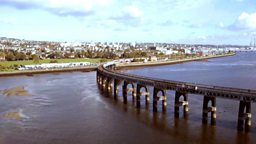Dundee: the beginning of me and modern Scotland
By Brian Taylor, Political Editor, �������� Scotland
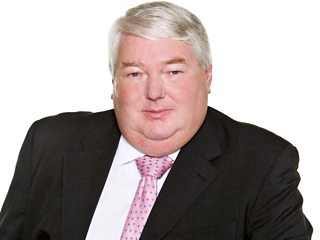
The great and noble city of Dundee – guess where I was born – has more than its share of fine statues, appreciated in equal measure by the citizenry and birdlife.
But you will search in vain for a monument to Winston Churchill, despite the fact that he was Dundee’s MP for a full fourteen years, from 1908 until his humiliating defeat in 1922.
If I am right, there was such a plan but it came to nought. In the decades after that defeat, Dundee’s relationship with the great man was slightly fraught.
The froideur, it seems, was returned. In 1943, at the height of Churchill’s wartime power, councillors in Dundee agreed by a single vote to offer him the Freedom of the City. The offer was curtly declined.
Dundee’s memorial to Churchill is a small plaque, unveiled in 2008 to mark the centenary of his election.
In his Dundee years, Churchill was a Liberal MP. Previously – and subsequently – he adhered to the Conservative cause. As he said himself, any fool can rat but it takes a certain amount of ingenuity to re-rat.
The Birth of Modern Scotland
tells the tale with insight and intelligence. The robust vigour of the campaign – the public rallies, the heckling – contrasting with the physical frailty of Churchill at the time.
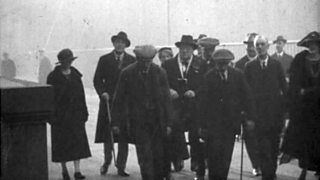
...uncomfortably resembling a Maharajah descending upon his people.
Recovering from an operation, he is carried into the city for the election contest, uncomfortably resembling a Maharajah descending upon his people.
When the votes are counted, the sitting MP is ousted in this two seat contest by a Prohibitionist and a Socialist. (Both traits anathema to Churchill.) The people have spoken.
But there is more – much more – than mere story-telling, however compelling. We gain context from the broader period: women’s suffrage, the economy, poverty and affluence, the earliest origins of what was to become the SNP.
We experience Red Clydeside – powerful oratory, tanks in Glasgow’s George Square – against the background of the Russian Revolution.
Yet, shunning simplistic cliché, the movie also manages to tell the tale of what it calls Blue Clydeside, a Conservative-supporting, affluent middle class.
The screen in the DCA fills with posh frocks and polished fellows.
The screening over, I appealed for questions from the packed audience. Instantly, a hand was raised, that of Gordon Wilson – one of Churchill’s successors as a Dundee MP. What a deft concatenation of circumstances, the historic and the recent.
The discussion continued, enthused and enthusiastic. We screen clips from the two other programmes in the series and my panel – Dr Billy Kenefick from Dundee University, Professor Marjory Harper from Aberdeen and Professor Alan Riach from Glasgow – contributed with intellect and verve, responding to points from the audience and delving into issues arising from the movies.
��������s For Highland Heroes
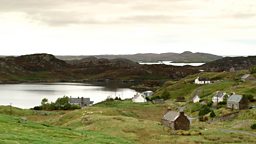
The talk surrounding episode two was of emigration.
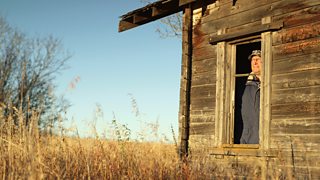
Could the money spent encouraging people to move to the dominions have been better deployed investing in economic growth at home? Or is that naïve?
That programme focuses particularly upon the Western Isles. The story, still contentious, of Lord Leverhulme and his efforts to supplant a crofting economy with industrial development.
The story of those who stayed. How marvellous to see contemporary residents of the Hebrides talk with passion and verve about their antecedents, addressing century-old controversies as if they were pertinent and present.
Which, for the Hebrideans, they undoubtedly are, as they confront current economic and social challenges.
The story of those who left. The welcome – or lack thereof – which greeted them in Canada and elsewhere. Powerfully told, beautifully filmed.
The Cultural Revolution
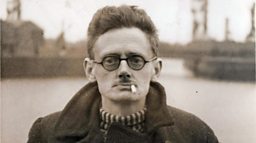
Watch with fascination, as I did, to learn the role of Montrose in this intellectual revolution. Just watch.
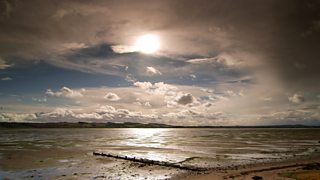
The Dundee discourse here is glorious.
An examination of how political and cultural awareness are interlinked.
A thoughtful, polite exchange of political and cultural insight.
We left, uplifted. As I daundered back along the Nethergate, I thought again of Churchill’s Dundee sojourn – and the Prohibitionist candidate who ousted him.
I thought of the street song, vaguely recalled from my youth, which referenced that candidate.
I remembered how we youthfully trilled: “Vote, vote, vote for Neddy Scrymgeour. He’s the man tae gie ye ham an’ eggs!”
Promises, promises. Politicians the world over.
